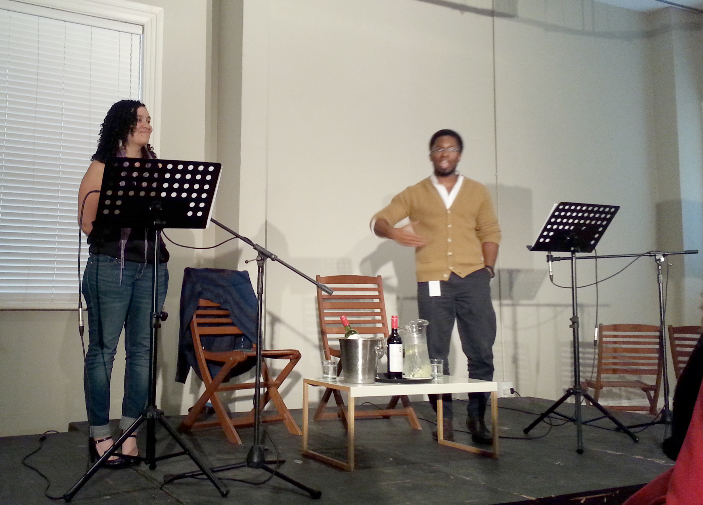Urban Verse – The Sequel, 17 September 2014, Open Book Festival, Fugard Annexe 1, Cape Town. With Jacob Sam-La Rose and Toni Stuart.
JANA FERREIRA
This enigmatic multi-media presentation of urban poetry, crossing experiences from two cities via Toni, who is from Cape Town and Jacob, who is from London, proved an inspirational and entertaining event hosted by the 2014 Open Book Festival.
Jacob and Toni brought about this project by approaching their poetry from their particular cities in a dialogue form. Jacob calls their collaboration “a work of continuous growth and an organic evolution of back-and-forth between us.”
Situated in a small room that held about 60 poetry enthusiasts, the atmosphere was personal and cozy. Jacob and Toni make use of technological backtracks as they recite their poetry and control the volume of each of their respective poems’ background noises by using iPads. The technological advances and engagement with 21st century apparatus while engaging with the age-old act of performing married beautifully in their choice of sound and poems together.
The poetry itself was impressive, even when ignoring the way in which the sounds complemented the two poets’ voices and gave eerie context to their poetry as if one is in a film and life suddenly has a backtrack. Their poetry entailed contextualising the cityscape from the perspective of the tourist as well as the inhabitant. Seascapes complemented poetry of Cape Town, whereas the insertion of analysing language in terms of poetry and narratives of individual and group identity complemented London narratives in Jacob’s poetry.
The sounds used as backtrack to the poems were very aptly suitable to the tone the poets set for the audience in terms of what they were trying to convey with their poem as well as the ultimate performance thereof. Some examples of sounds used include: static, white noise, crackles, crowd sounds, beeps, drumbeats and clicks.
Jacob and Toni take turns to read their poems, which creates a lulling atmosphere, but at the same time breaks the potential for getting lost in one poet’s voice and losing sight of the context of the thirteen recited poems. Some of their poems are overlapped, where Toni might interrupt Jacob and then continue to recite her own poem, also bridging the gap between the two cities that are being discussed in the poetry, namely Cape Town and London. “The soundscapes add another layer of connectivity between us”, says Jacob. Another way of having successfully done this is that Jacob might end the poem with a line and Toni then begins her next poem with that same line, creating commonality between their cities and poems.
The experience of seeing poetry performed as lyrics to backtrack music was an original and rousing way of hearing poetry and feeling poetry move with other sounds. When asked why they chose to add the sounds or music to their performance, Toni answered that music has always been a large part of her writing experience and that it is interesting to see what happens to how one reads and recites poetry differently when sound is added. Jacob says, “It creates a distinctive mood.” One member of the audience commented that she missed hearing human voices as part of city noise in some of the backing sounds, but Jacob replied that he did not want to take away from the poetry and the sound of them performing it in any way, thus opting for static sounds was more appropriate.
Jacob and Toni are both adamant that they did not add the sounds for mere entertainment value, but rather to “see what it could add to the poems in a meaningful way”. Toni explained beautifully that life does not happen in pockets, thus their poetry shouldn’t have to either. She says, “Words are elastic and when you engage with different mediums, that elasticity expands and changes the way the words sound”.
Jacob and Toni’s rendition of performing poetry proved an intriguing experience for the audience as well as for them as poets. The urban feel and the contextualisation of their material in the urban space of Cape Town and the soundscapes that were utilised, localised the poetry as part of an internal urban space in each of us. The effect was to create a highly compelling as well as probing and experimental way of presenting word-art to their audience.
 SLiPStellenbosch Literary Project
SLiPStellenbosch Literary Project 